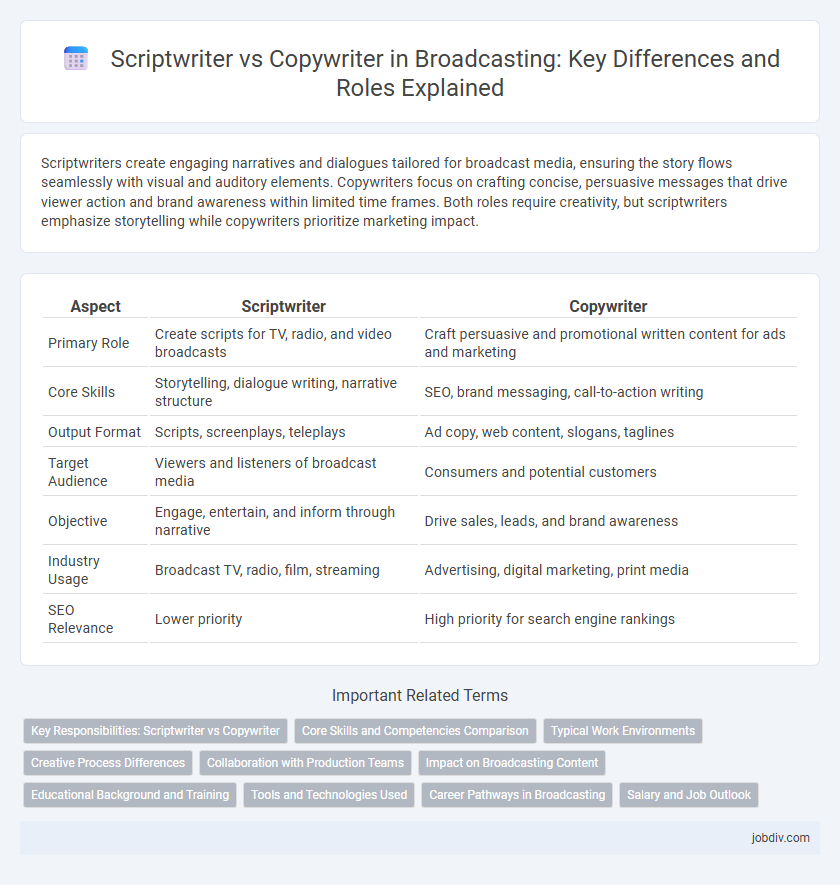Scriptwriters create engaging narratives and dialogues tailored for broadcast media, ensuring the story flows seamlessly with visual and auditory elements. Copywriters focus on crafting concise, persuasive messages that drive viewer action and brand awareness within limited time frames. Both roles require creativity, but scriptwriters emphasize storytelling while copywriters prioritize marketing impact.
Table of Comparison
| Aspect | Scriptwriter | Copywriter |
|---|---|---|
| Primary Role | Create scripts for TV, radio, and video broadcasts | Craft persuasive and promotional written content for ads and marketing |
| Core Skills | Storytelling, dialogue writing, narrative structure | SEO, brand messaging, call-to-action writing |
| Output Format | Scripts, screenplays, teleplays | Ad copy, web content, slogans, taglines |
| Target Audience | Viewers and listeners of broadcast media | Consumers and potential customers |
| Objective | Engage, entertain, and inform through narrative | Drive sales, leads, and brand awareness |
| Industry Usage | Broadcast TV, radio, film, streaming | Advertising, digital marketing, print media |
| SEO Relevance | Lower priority | High priority for search engine rankings |
Key Responsibilities: Scriptwriter vs Copywriter
Scriptwriters develop detailed dialogue, character actions, and scene directions to create engaging audiovisual content for television, film, or radio, emphasizing narrative flow and emotional impact. Copywriters craft concise, persuasive text for advertisements, promotional materials, and digital content, focusing on brand messaging and audience engagement. Both roles require strong writing skills but differ in purpose: scriptwriters build storytelling frameworks, whereas copywriters drive marketing objectives.
Core Skills and Competencies Comparison
Scriptwriters excel in crafting engaging narratives and dialogues tailored for visual and audio media, emphasizing story structure, character development, and timing to enhance broadcast content. Copywriters specialize in persuasive writing aimed at marketing and advertising, focusing on clarity, brand voice consistency, and call-to-action effectiveness across various platforms. Both roles demand creativity and strong writing skills, but scriptwriters prioritize storytelling within time constraints while copywriters concentrate on concise, impactful messaging to influence audience behavior.
Typical Work Environments
Scriptwriters primarily work in dynamic studio settings or production companies, collaborating closely with directors, producers, and actors to develop engaging content for television, film, and digital media. Copywriters tend to operate within advertising agencies, marketing firms, or corporate environments where they craft persuasive promotional material for commercials, social media, and brand campaigns. Both roles demand creativity and adaptability but differ significantly in their workplace atmosphere and project timelines.
Creative Process Differences
Scriptwriters develop detailed narratives and dialogue tailored for visual and auditory storytelling in broadcasting, emphasizing character development and scene structure to engage audiences. Copywriters focus on concise, persuasive language designed to promote products or ideas, prioritizing clarity and emotional impact within brief timeframes. The creative process for scriptwriters involves crafting coherent story arcs and pacing for episodes or commercials, whereas copywriters concentrate on catchy slogans and calls to action that drive viewer response.
Collaboration with Production Teams
Scriptwriters collaborate closely with directors, producers, and actors to develop engaging dialogue and narrative flow that aligns with the visual storytelling and production constraints. Copywriters work alongside marketing teams and brand strategists to craft compelling messages that resonate with target audiences and enhance promotional content within broadcasts. Effective collaboration between scriptwriters and copywriters ensures coherence between the creative script and the advertising copy, optimizing viewer engagement and campaign impact.
Impact on Broadcasting Content
Scriptwriters craft dialogues and narratives that shape the storytelling and emotional impact of broadcasting content, ensuring audience engagement through well-structured scenes and character development. Copywriters focus on concise, persuasive messaging designed to promote programs or products effectively within broadcasting segments, enhancing viewer retention and brand recall. Both roles are essential in broadcasting, with scriptwriters driving content depth while copywriters amplify marketing and audience targeting impact.
Educational Background and Training
Scriptwriters in broadcasting typically hold degrees in film, communication, or creative writing, emphasizing storytelling techniques and narrative development. Copywriters often have educational backgrounds in marketing, advertising, or journalism, focusing on persuasive language and brand messaging. Training for scriptwriters includes workshops on dialogue and scene structure, while copywriters undergo courses in SEO, consumer psychology, and digital marketing strategies.
Tools and Technologies Used
Scriptwriters typically utilize specialized software such as Final Draft, Celtx, and Movie Magic Screenwriter for formatting and structuring scripts efficiently. Copywriters rely heavily on digital marketing tools like Grammarly, SEO platforms such as SEMrush, and content management systems to optimize and refine persuasive messaging. Both professions increasingly integrate collaboration platforms like Google Workspace and project management tools to streamline workflow and communication.
Career Pathways in Broadcasting
Scriptwriters in broadcasting develop dialogue and narratives specifically for TV shows, radio, and digital media, emphasizing storytelling and character development to engage audiences. Copywriters focus on crafting concise, persuasive content for advertisements, promos, and station branding, optimizing language for maximum audience impact and conversion. Career pathways for scriptwriters often lead to roles in production and directing, while copywriters may advance to creative director or marketing strategist positions within broadcasting companies.
Salary and Job Outlook
Scriptwriters in broadcasting typically earn an average salary ranging from $50,000 to $75,000 annually, with opportunities expanding as demand for original content increases in television and digital media. Copywriters usually see salaries between $45,000 and $70,000, benefiting from a steady job outlook driven by advertising agencies and corporate marketing departments. Both roles offer growth potential, but scriptwriters may experience more volatility tied to production cycles, while copywriters often enjoy consistent work from ongoing campaigns.
Scriptwriter vs Copywriter Infographic

 jobdiv.com
jobdiv.com